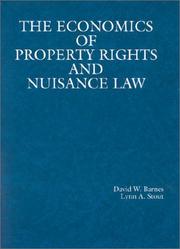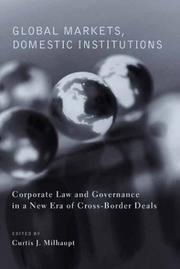| Listing 1 - 10 of 11 | << page >> |
Sort by
|
Book
ISBN: 1282821016 9786612821011 140083600X 0691139954 9780691139951 9781400836000 9781282821019 Year: 2011 Publisher: Princeton : Princeton University Press,
Abstract | Keywords | Export | Availability | Bookmark
 Loading...
Loading...Choose an application
- Reference Manager
- EndNote
- RefWorks (Direct export to RefWorks)
Contemporary law and public policy often treat human beings as selfish creatures who respond only to punishments and rewards. Yet every day we behave unselfishly--few of us mug the elderly or steal the paper from our neighbor's yard, and many of us go out of our way to help strangers. We nevertheless overlook our own good behavior and fixate on the bad things people do and how we can stop them. In this pathbreaking book, acclaimed law and economics scholar Lynn Stout argues that this focus neglects the crucial role our better impulses could play in society. Rather than lean on the power of greed to shape laws and human behavior, Stout contends that we should rely on the force of conscience. Stout makes the compelling case that conscience is neither a rare nor quirky phenomenon, but a vital force woven into our daily lives. Drawing from social psychology, behavioral economics, and evolutionary biology, Stout demonstrates how social cues--instructions from authorities, ideas about others' selfishness and unselfishness, and beliefs about benefits to others--have a powerful role in triggering unselfish behavior. Stout illustrates how our legal system can use these social cues to craft better laws that encourage more unselfish, ethical behavior in many realms, including politics and business. Stout also shows how our current emphasis on self-interest and incentives may have contributed to the catastrophic political missteps and financial scandals of recent memory by encouraging corrupt and selfish actions, and undermining society's collective moral compass. This book proves that if we care about effective laws and civilized society, the powers of conscience are simply too important for us to ignore.
Conscience. --- Law - Moral and ethical aspects. --- Law -- Moral and ethical aspects. --- Law and ethics. --- Conscience --- Law and ethics --- Law --- Philosophy --- Ethics --- Philosophy & Religion --- Moral and ethical aspects --- Moral and ethical aspects. --- Acts, Legislative --- Enactments, Legislative --- Laws (Statutes) --- Legislative acts --- Legislative enactments --- Ethics and law --- Law and morals --- Morals and law --- Jurisprudence --- Legislation --- Guilt --- Superego --- Droit --- Philosophie --- Sources
Book
ISBN: 9781605098135 1605098132 9786613532077 1605098159 1280128194 9781605098159 9781605098166 1605098167 9781280128196 661353207X Year: 2012 Publisher: San Francisco : Berrett-Koehler,
Abstract | Keywords | Export | Availability | Bookmark
 Loading...
Loading...Choose an application
- Reference Manager
- EndNote
- RefWorks (Direct export to RefWorks)
“Shareholder value is the dumbest idea in the world.” —Jack Welch Executives, investors, and the business press routinely chant the mantra that corporations are required to “maximize shareholder value.” In this pathbreaking book, renowned corporate expert Lynn Stout debunks the myth that corporate law mandates shareholder primacy. Stout shows how shareholder value thinking endangers not only investors but the rest of us as well, leading managers to focus myopically on short-term earnings; discouraging investment and innovation; harming employees, customers, and communities; and causing companies to indulge in reckless, sociopathic, and irresponsible behaviors. And she looks at new models of corporate purpose that better serve the needs of investors, corporations, and society.
Stockholders. --- Corporate governance. --- Corporations --- Investor relations. --- Valuation. --- Stocks --- Investor relations with corporations --- Shareholder relations with corporations --- Stockholders --- Governance, Corporate --- Industrial management --- Directors of corporations --- Investors --- Shareholders --- Capitalists and financiers --- Corporation law --- Valuation --- Finance --- Shareholder relations --- Public relations --- Investor relations --- Corporate governance --- E-books
Book
ISBN: 9781523095667 1523095660 9781523095674 1523095679 9781523095650 1523095652 Year: 2019 Publisher: Oakland, CA
Abstract | Keywords | Export | Availability | Bookmark
 Loading...
Loading...Choose an application
- Reference Manager
- EndNote
- RefWorks (Direct export to RefWorks)
"Corporations have a huge influence on the life of every citizen—this book offers a visionary but practical plan to give every citizen a say in how corporations are run while also gaining some supplemental income. It lays out a clear approach that uses the mechanisms of the private market to hold corporations accountable to the public. This would happen through the creation of what the authors call the Universal Fund, a kind of national, democratic, mega mutual fund. Every American over eighteen would be entitled to a share and would participate in directing its share voting choices. Corporations and wealthy individuals would donate stocks, bonds, cash, or other assets to the fund just like they do to other philanthropic ventures now. The fund would pay out dividends to its citizen-shareholders that would grow as the fund grows. The Universal Fund is undoubtedly a big idea, but it is also eminently practical: it uses the tools of capitalism, not government, to give all citizens a direct influence on corporate actions. It would be a major institutional investor beholden not to a small elite group of stockholders pushing for short-term gain but to everyone. The fund would reward corporations that made sure their actions didn't harm people, communities, and the environment, and it would enable them to invest in innovations that would take more than a few months to pay off. Which is another reason corporations would donate to the fund—they could be freed from the constant pressure to maximize their quarterly share price and would essentially be subsidized for doing good. The authors demonstrate that our current economic rules force corporations to be shortsighted and even destructive because for most large investors, nothing matters but share price. The Universal Fund is designed to be a powerful positive balancing force, making the world a better place and the United States a better nation.' -- Provided by publisher
E-books --- Basic income. --- Capitalism. --- Free enterprise. --- Citizenship. --- Birthright citizenship --- Citizenship --- Citizenship (International law) --- National citizenship --- Nationality (Citizenship) --- Political science --- Public law --- Allegiance --- Civics --- Domicile --- Political rights --- Free markets --- Laissez-faire --- Markets, Free --- Private enterprise --- Economic policy --- Market economy --- Economics --- Profit --- Capital --- Annual income guarantee --- Basic income guarantee --- Guaranteed annual income --- Guaranteed income --- Guaranteed minimum income --- Universal basic income --- Economic security --- Income --- Income maintenance programs --- Law and legislation

ISBN: 9780314010926 0314010920 Year: 1992 Publisher: St. Paul: West publishing,
Abstract | Keywords | Export | Availability | Bookmark
 Loading...
Loading...Choose an application
- Reference Manager
- EndNote
- RefWorks (Direct export to RefWorks)

ISBN: 9780314010889 0314010882 Year: 1992 Publisher: Saint Paul (Minn.): West publishing,
Abstract | Keywords | Export | Availability | Bookmark
 Loading...
Loading...Choose an application
- Reference Manager
- EndNote
- RefWorks (Direct export to RefWorks)
Book
ISBN: 9780190610265 Year: 2022 Publisher: Oxford Oxford University Press
Abstract | Keywords | Export | Availability | Bookmark
 Loading...
Loading...Choose an application
- Reference Manager
- EndNote
- RefWorks (Direct export to RefWorks)
Book
ISBN: 9780190610289 0197601502 019061028X Year: 2022 Publisher: New York, NY : Oxford University Press,
Abstract | Keywords | Export | Availability | Bookmark
 Loading...
Loading...Choose an application
- Reference Manager
- EndNote
- RefWorks (Direct export to RefWorks)
An authoritative and practical guide to business ethics, written in an accessible-question-and answer format. In today's turbulent business climate, business ethics are more important than ever. Surveys of employees show that misconduct is on the rise. Cover stories reporting indictments, prosecutions, and penalties imposed for unethical business conduct appear almost daily. Legislatures pass requirements elevating the levels of punishment and their enforcement against corporations and individuals. Organizations face pressure to design and implement effective ethics and compliance programs. As a result, businesses and businesspeople are increasingly worried that their conduct might cross lines that put their wealth and reputations at risk. Business Ethics: What Everyone Needs to Know ® explains what those lines are, how not to cross them, and what to do when they are crossed. Written for both business people facing real-life dilemmas and students studying ethical questions, this succinct book uniquely surveys materials from moral philosophy, behavioral science, and corporate law, and shares practical advice. Experts J.S. Nelson and Lynn A. Stout cover a wide array of essential topics including the legal status of corporations, major ethical traps in modern business, negotiations, whistleblowing and liability, and best practices. Written in a short question-and-answer style, this resource provides engaging and readable introductions to the basic principles of business ethics, and an invaluable guide for dealing with ethical dilemmas.--
E-books --- Business ethics. --- Business enterprises --- Moral and ethical aspects.
Book
ISBN: 0190610298 0197601502 019061028X Year: 2022 Publisher: New York, New York : Oxford University Press,
Abstract | Keywords | Export | Availability | Bookmark
 Loading...
Loading...Choose an application
- Reference Manager
- EndNote
- RefWorks (Direct export to RefWorks)
"An authoritative and practical guide to business ethics, written in an accessible-question-and answer format. In today's turbulent business climate, business ethics are more important than ever. Surveys of employees show that misconduct is on the rise. Cover stories reporting indictments, prosecutions, and penalties imposed for unethical business conduct appear almost daily. Legislatures pass requirements elevating the levels of punishment and their enforcement against corporations and individuals. Organizations face pressure to design and implement effective ethics and compliance programs. As a result, businesses and businesspeople are increasingly worried that their conduct might cross lines that put their wealth and reputations at risk. Business Ethics: What Everyone Needs to Know ® explains what those lines are, how not to cross them, and what to do when they are crossed. Written for both business people facing real-life dilemmas and students studying ethical questions, this succinct book uniquely surveys materials from moral philosophy, behavioral science, and corporate law, and shares practical advice. Experts J.S. Nelson and Lynn A. Stout cover a wide array of essential topics including the legal status of corporations, major ethical traps in modern business, negotiations, whistleblowing and liability, and best practices. Written in a short question-and-answer style, this resource provides engaging and readable introductions to the basic principles of business ethics, and an invaluable guide for dealing with ethical dilemmas" --Provided by publisher.
Book

ISBN: 9780231501767 Year: 2003 Publisher: New York, NY
Abstract | Keywords | Export | Availability | Bookmark
 Loading...
Loading...Choose an application
- Reference Manager
- EndNote
- RefWorks (Direct export to RefWorks)


ISBN: 9780231501767 9780231127134 Year: 2003 Publisher: New York, N.Y. Columbia University Press
Abstract | Keywords | Export | Availability | Bookmark
 Loading...
Loading...Choose an application
- Reference Manager
- EndNote
- RefWorks (Direct export to RefWorks)
| Listing 1 - 10 of 11 | << page >> |
Sort by
|

 Search
Search Feedback
Feedback About UniCat
About UniCat  Help
Help News
News